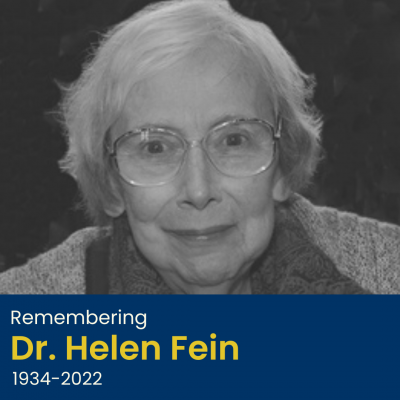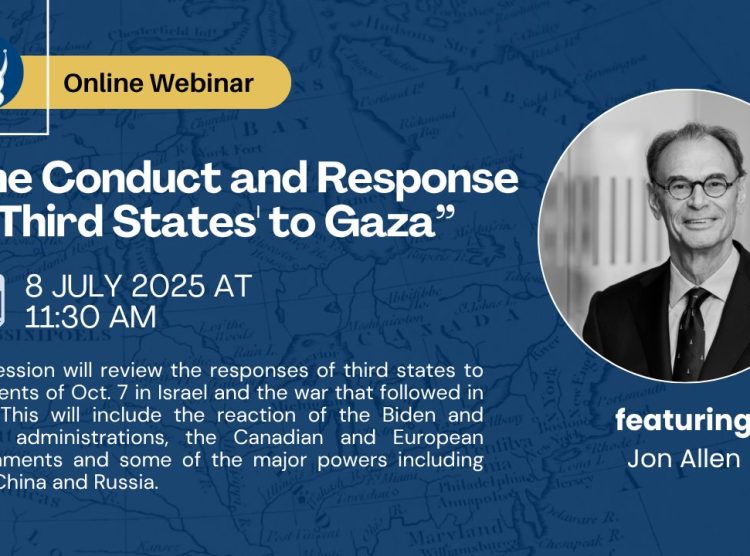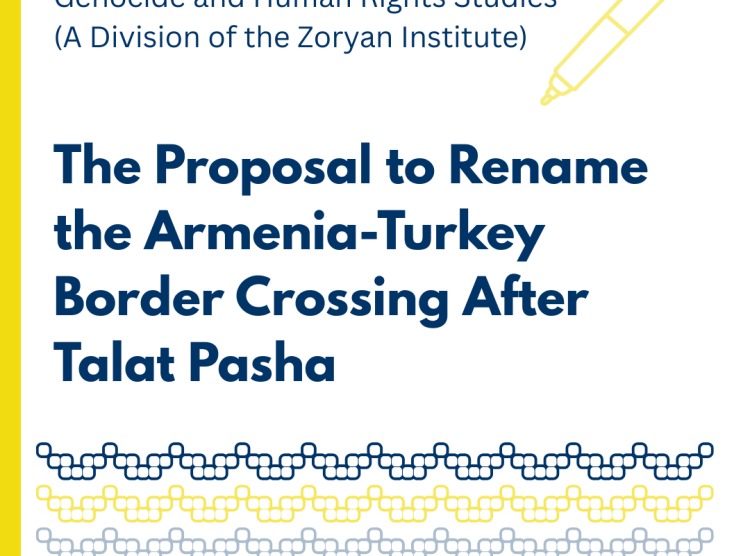 May 27, 2022: It is with great sadness that we announce the passing of Dr. Helen Fein, a pioneer in the field of genocide studies, on May 14, 2022.
May 27, 2022: It is with great sadness that we announce the passing of Dr. Helen Fein, a pioneer in the field of genocide studies, on May 14, 2022.
Dr. Fein was one of the four co-founders and first president of the International Association of Genocide Scholars (IAGS), and had established her own organization, the Institute for the Study of Genocide (IGS), some years earlier. Among many other initiatives, the IGS established and continues to award the Lemkin Book Award for the best book on genocide and human rights published in the English language, every two years. Her landmark work Accounting for Genocide (1979) received the American Sociological Association Sorokin Award and was cited as “a brilliantly original interpretation of a complex and singular process, that has until now defied comprehensive social analysis.” This early volume, along with her later writings, emphasized the importance of the understanding and acknowledgment of the processes and state intentionality of carrying out genocide, and that included the Armenian Genocide, as she made clear as early as 1979.
Discussing her contributions to the field of genocide studies, Dr. Joyce Apsel, Clinical Professor in the College of Arts & Sciences at New York University, and Course Director of the Zoryan Institute’s Genocide and Human Rights University Program, said:
“Dr. Helen Fein coined such terms as “outside the sanctified universe of obligation” to “calculus of genocide” and “genocide by attrition”, concepts that she linked to the processes of destruction against a series of targeted groups. Her groundbreaking work continues to influence scholarship in genocide studies and prevention as well as a series of related fields of study. Her life and legacy are that of an engaged scholar and activist… [with] deep integrity and concern for social justice.”
Dr. Roger Smith, Professor Emeritus at the College of William and Mary, and Co-Chair of The Zoryan Institute’s Academic Board of Directors shared similar sentiments, and expanded on the influence Dr. Fein’s work had on the work of the Zoryan Institute:
“Dr. Fein’s scholarship in many ways provided the foundation for the study, understanding, and prevention of genocide. Her clarification of terms, identification of the elements that make genocide possible, and perhaps preventable, and [emphasis on] the need for comparative study, underlie much that is part and parcel of the field of genocide studies today. She was an advocate as well, speaking out to the public and those in positions of power. Her approach supports the work that the Zoryan Institute does, with its emphasis on comparison, education, and advocacy. She also did important work on the role of gender in genocide, something that Zoryan has turned to in its summer seminar, the Genocide and Human Rights University Program…I knew Helen Fein for over 25 years and we worked together on a number of projects. She lived a remarkable life, one dedicated to truth, justice, and caring for those in need. It was my good fortune over the years to have had her as a friend, mentor, and inspiration.”
Although Dr. Fein had written extensively about the Armenian Genocide, was colleagues with several scholars who were members of the Zoryan Institute, and had included several book reviews about the Armenian Genocide in the IGS newsletter, it was in 1995 that she was introduced to the Zoryan Institute at the Problems of Genocide Conference in Yerevan, Armenia, co-organized by the Zoryan Institute. She was at that time both the President of her own organization, the IGS, as well as the IAGS. At the conference, she spoke in particular about the need for comparative genocide studies, which was rare at the time. She was the only female scholar to participate in the conference, perhaps paving the way for women in the field of genocide studies. Dr. Fein remained dear friends and a close colleague to many of Zoryan Institute’s scholars and Directors.
Reflecting on her loss, Zoryan Institute President, K.M. Greg Sarkissian, stated:
“Every time we say goodbye to one of the pioneers in the genocide studies community, it truly feels like we lose a family member. It brings us peace knowing that her work will influence and guide future scholars in the field, and will continue to be instrumental in promoting human rights, and helping to prevent future genocides and mass atrocities.”
The Zoryan Institute Board of Directors, staff, and volunteers wish to express our deepest sympathies to Dr. Fein’s family, friends and loved ones during this difficult time.




